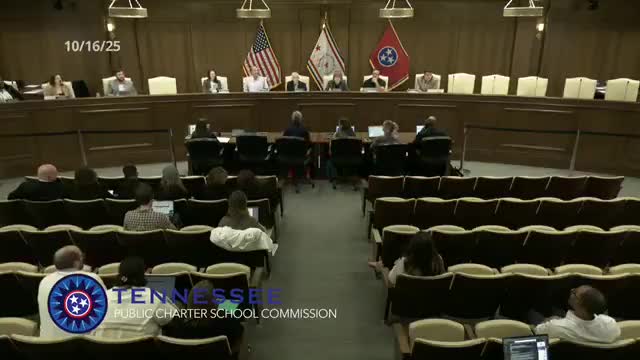Commission hears school performance updates, strategic plan progress and new complaint system; staff reports sunset extension recommendation
October 20, 2025 | Tennessee Public Charter School Commission, Deparments in Office of the Governor, Organizations, Executive, Tennessee
This article was created by AI summarizing key points discussed. AI makes mistakes, so for full details and context, please refer to the video of the full meeting. Please report any errors so we can fix them. Report an error »

Commission staff provided updates Oct. 16 on school performance measures, the commission’s strategic plan, a new complaints intake system and recent interactions with the General Assembly.
Maggie Lund, deputy director of authorizing, presented a committee update on the Opportunity Public Charter School Framework (commission policy 3.71) and a school-year 2025–26 account of data available to the commission. Lund outlined the framework’s academic and organizational performance categories, noted stakeholder engagement used to develop the draft, and described a line item in the organizational section that captures requirement language that Opportunity Public Charter Schools serve 75% at‑risk students as outlined in state law. The committee voted to approve the TISA accountability report during the meeting.
Pam Lehman, manager of strategic initiatives, presented strategic plan progress across four priorities. She said the commission received eight new-start appeals this cycle (two previously heard at the August meeting and six heard Oct. 16–17), launched 25 training sessions for schools for the 2025–26 year (18 completed to date) and rolled out a new online complaint system to streamline community and family concerns. Lehman said the commission added two benchmarks to track implementation of public chapter 275 and the Opportunity Public Charter School Framework.
Maggie Stampley, introduced by staff to explain the complaint intake process, said the online form contains a dropdown that maps complaints to the appropriate steps and explicitly lists what the commission can address versus issues the local school should handle. “The process currently is … there are 8 days for us to follow-up directly with the school,” Stampley said, describing outreach to both complainant and school and next steps based on documentation received.
Executive Director Tess Stovall briefed commissioners on the agency’s week with the General Assembly. Hayden Pendergrass reported that the commission’s sunset hearing was recommended for a four‑year extension by the joint government operations subcommittee; permanent legislation will still be filed and must be considered by the full committees during session. Staff also reported an emergency version of the replication rule received positive review and that the permanent rule — now adopted by the commission at final reading — will return to government operations for review in coming months.
Staff also flagged legislative topics to watch for 2026: proposals related to inclusion of pre-K special education funding in the TISA formula, potential legislation related to Memphis‑Shelby County Schools tied to a forensic audit, ongoing K–12 innovation committee work around testing and accountability and possible expansion of the Education Freedom Scholarship program. Commissioners asked questions about how the complaint process engages schools and about the commission’s role if federal education responsibilities shift; staff said they were monitoring developments and would report back as details emerge.
Maggie Lund, deputy director of authorizing, presented a committee update on the Opportunity Public Charter School Framework (commission policy 3.71) and a school-year 2025–26 account of data available to the commission. Lund outlined the framework’s academic and organizational performance categories, noted stakeholder engagement used to develop the draft, and described a line item in the organizational section that captures requirement language that Opportunity Public Charter Schools serve 75% at‑risk students as outlined in state law. The committee voted to approve the TISA accountability report during the meeting.
Pam Lehman, manager of strategic initiatives, presented strategic plan progress across four priorities. She said the commission received eight new-start appeals this cycle (two previously heard at the August meeting and six heard Oct. 16–17), launched 25 training sessions for schools for the 2025–26 year (18 completed to date) and rolled out a new online complaint system to streamline community and family concerns. Lehman said the commission added two benchmarks to track implementation of public chapter 275 and the Opportunity Public Charter School Framework.
Maggie Stampley, introduced by staff to explain the complaint intake process, said the online form contains a dropdown that maps complaints to the appropriate steps and explicitly lists what the commission can address versus issues the local school should handle. “The process currently is … there are 8 days for us to follow-up directly with the school,” Stampley said, describing outreach to both complainant and school and next steps based on documentation received.
Executive Director Tess Stovall briefed commissioners on the agency’s week with the General Assembly. Hayden Pendergrass reported that the commission’s sunset hearing was recommended for a four‑year extension by the joint government operations subcommittee; permanent legislation will still be filed and must be considered by the full committees during session. Staff also reported an emergency version of the replication rule received positive review and that the permanent rule — now adopted by the commission at final reading — will return to government operations for review in coming months.
Staff also flagged legislative topics to watch for 2026: proposals related to inclusion of pre-K special education funding in the TISA formula, potential legislation related to Memphis‑Shelby County Schools tied to a forensic audit, ongoing K–12 innovation committee work around testing and accountability and possible expansion of the Education Freedom Scholarship program. Commissioners asked questions about how the complaint process engages schools and about the commission’s role if federal education responsibilities shift; staff said they were monitoring developments and would report back as details emerge.
View full meeting
This article is based on a recent meeting—watch the full video and explore the complete transcript for deeper insights into the discussion.
View full meeting
